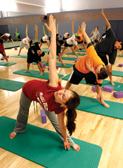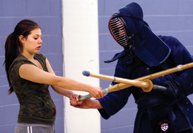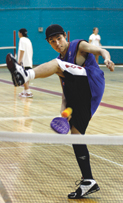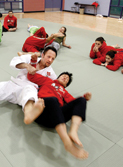Sporting chance
Camp benefits Aboriginal youths
Photos by Owen Egan

Karahkwisakhe Horne finds inner peace while hitting a Utthita Parsvakonasana pose during a yoga session.
On Friday, May 19, a small group of teens ran up University Ave., the hoods of their red sweatshirts pulled tight against the relentless rain. Their gait was easy and effortless – an unintentional nose-thumb to McGillians who have huffed and puffed up this taxing hill for decades. While noontime lunchers tiptoed delicately around the puddles in search of a warm enclave to nibble shish taouk, these 24 Aboriginal youth raced against time in the campus-wide scavenger hunt as part of McGill's first-ever High-Performance Camp.
Organized by McGill's First People's House, the camp was designed to stimulate teens' interest in higher education through sports. Lots of sports. The camp was the brainchild of Waneek Horn-Miller, the director of First People's House and co-captain of the Canadian women's Olympic water polo team in the 2000 Games in Sydney, Australia. A single glance at the schedule she had drawn up for the three-day camp and one would think she was whipping this unsuspecting group into shape for the next Olympics.

Later, she learns the finer points of mashing an opponent's bones to paste in Kendo.
Each morning of their stay at New Rez, the teens were roused from their slumber at 7:00 am. Campers participated in a wide range of sporting activities, from their grueling relay race up the stairs on Mount Royal at 9:00 am Friday morning, to their last game of Ultimate Frisbee on Sunday afternoon. In between, the group shot hoops, played puff ball and racquetball, took a spinning class, twisted tired muscles in yoga class, tried their hand at water polo, pumped some iron, and did their best Jackie Chan impersonation in a two-hour martial arts workshop. When participants complained of fatigue or muscle pain, Horn-Miller just smiled and said "If you want to be a high-level athlete you'd better get used to it. I walked around for ten years feeling tired and sore."

Jon-Ross Merasty Moose earns big style points during a game of puff ball.
Interspersed among the workouts and games were a series of workshops on nutrition, visualization and sports psychology. Several Olympic medalists, including swimmer Marieanne Limpert and cyclist and speed skater Clara Hughes, dropped in to offer their encouragement.
For Horn-Miller, the impact of such camps extends well beyond the sporting arena. One goal was to expose teens to an institution like McGill and, by all accounts, that goal was met. Horn-Miller talks about a Grade 11 student from Thompson, Manitoba, who didn't know that sports psychology existed as a discipline. "Now he wants to learn more about it and maybe pursue a career in it," she says.

Waneek Horn-Miller gets roughed up by three-time Olympic judoka and McGill alum, Keith Morgan.
The reality is that, for many Aboriginals, sports can boost self-esteem and combat such social problems as suicide. "Kids can grow up pretty fast, pretty harsh, in a native community," says Horn-Miller. "Even if your parents try and shield you from the bad stuff, there are issues all around you."
Athletics can offer a safe haven, even for those people living outside Aboriginal communities. Growing up in Ottawa, Horn-Miller felt the sting of ignorance and racism on a daily basis as the only person of colour in her school. "When you are The Other, you have to figure out how to succeed without conforming," she says. Taking her cue from Alwyn Morris, who accepted his Olympic gold medal in kayaking in 1984 while holding an eagle feather aloft to honour his grandfather and his Mohawk heritage, Horn-Miller found that nothing leveled the proverbial playing field faster than, well, kicking butt on that same playing field.
When asked if camps like this only provide false hope to teens by selling them the long-shot dream that the road to success is paved in gold medals, Horn-Miller is direct. "My goal has never been to make more Olympians," she says. "I'm all about producing happy, healthy people, because they are the ones who will become a positive influence in their community. And you know what? If we can create this healthy atmosphere, the success stories will come, be they in sports, school or other pursuits."

